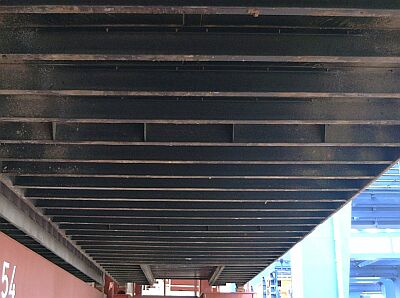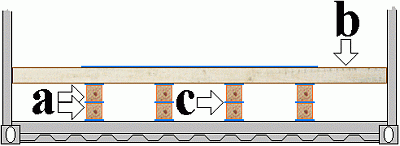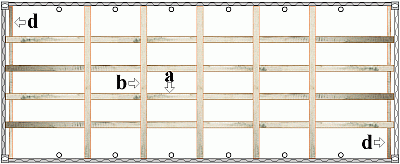Packing slabs in open-top containers
The advantage over packing in standard box containers is that friction-enhancing material can be used. This substantially reduces securing effort in terms of the necessary maximum securing loads. Moreover, many open-top containers have lashing points with a maximum securing load of 2,000 daN. However, these values are lower than those encountered when loading on flatracks.
Supports are required so that the slabs can be set down during packing and lifted up again on unpacking, unless special slab tongs were used which would allow the slabs to be set down directly on the container floor.
 |
|
| Bottom cross members of an open-top container |
Lengthwise wooden members are required in order to distribute the mass of the cargo on the bottom cross members. Wooden crosspieces are necessary in order to be able to set down and lift up slabs using normal load suspension and slinging means. A lattice of wooden members must accordingly be laid before packing.
 |
|
| Cross-section of wooden lattice support for the slab |
The stacked wooden beams (a) serve to transfer forces over the entire container floor, resulting in more effective transfer. Strips of friction-enhancing material are laid under, between and on top of the wooden members. The wooden crosspieces (b) are laid at right-angles across the lengthwise wooden members. Theoretically, they could finish at the outermost lengthwise wooden members. In this case, they are continued to the container side walls to ensure better stabilization of the overall securing arrangement. In order to prevent the stacked wooden members (a) from tipping, planks (d) are arranged vertically between them at the front and rear of the container).
 |
|
| Cross-section including lengths of plank (d) to prevent tipping |
 |
|
| Lattice structure to transfer forces to container floor - plan view |
A total of approx. 64 linear meters of squared lumber and planks are required for the lattice shown - a considerable expense.